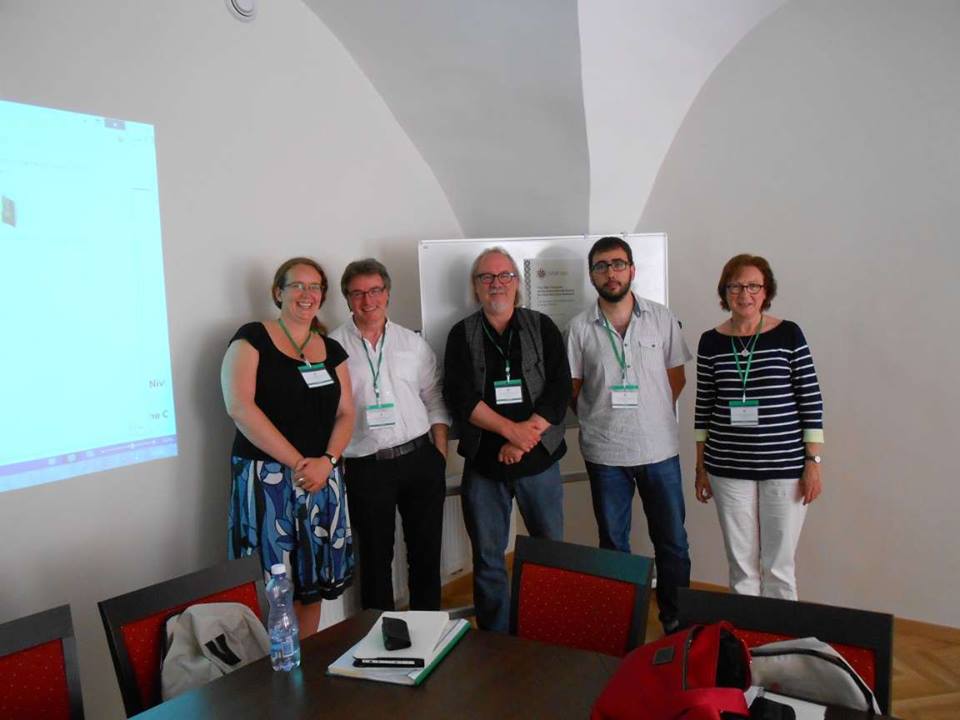
Members of the first session of the ISFNR-panel in Vilnius – from left to right: Cliona O’Carroll, Christoph Schmitt, Theo Meder, Emili Samper, and Carme Oriol. (Photo by Mereie de Jong)
At the conference of the International Society for Folk Narrative Research (ISFNR) in Vilnius, Lithuania, Theo Meder organized a panel called ‘Folk Narrative in the Modern World: Computers and the Internet’ on Wednesday, June 25th, 2013. The panel was divided into two sessions of four papers:
- Theo Meder (Meertens Instituut, AMSTERDAM, Netherlands): ‘A Scientific Folktale Database should be more than an Online Museum of Stories’.
- Carme Oriol & Emili Samper (Universitat Rovira i Virgili, TARRAGONA, Spain): ‘Catalan folk literature today: research database on the Internet’.
- Christoph Schmitt (Institut für Volkskunde, ROSTOCK, Germany): ‘Belief Narratives in Online Databases. Retrieval scenarios and the problem of internationally valid indexing, based on the example of the ‘WossiDiA’ project’.
- Cliona O’Carroll (University College Cork, CORK, Ireland): ‘Remembering and inhabiting the city through digital storytelling: The Cork Memory Map’.
- Violetta Krawczyk-Wasilewska & J. Andrew Ross (Lodz University, LODZ, Poland & formerly Oxford University, SCHWETZINGEN, Germany): ‘Global Cooking Stories and the Internet’.
- Maria Yelenevskaya (Technion-Israel Institute of Technology, HAIFA, Israel): ‘Nomads Online: Travel Notes in the Cyber Age’.
- Daria Radchenko (independent scholar, MOSCOW, Russian Federation): ‘’_ and nothing ever happened’: Parodies and Jokes About Chain Letters on the Internet’.
- Andres Kuperjanov & Mare Kõiva (Literary Museum, TARTU, Estonia: ‘Giant lore: further thoughts on transmedial narratives’.
The first three papers were dealing in particular with the problems and possibilities of online folktale databases. One of the purposes of the panel was to discuss the need and conditions for a future international harvester that would enable researchers to perform comparative research by performing queries in several databases simultaneously.
The panel was visited by approximately 30 international colleagues, and one of the scholars entering the disussion was Lauri Harvilahti from the University of Helsinki, Finland. It turned out that his presentation on the very next conference of the Société Internationale d’Etnologie et de Folklore (SIEF) in Tartu, Estonia on July 1 was in several ways rather similar to the paper by Theo Meder in Vilnius. At the General Meeting of the SIEF Harvilahti founded a new working group called ‘Archives’ that – among other things – would deal with digital archives as well. Theo Meder volunteered to become a member of this working group. At the SIEF conference, Meder was in a smaller panel called ‘Everyday Names, Tales, Songs and Play: Continuous Traditions in a Changing World’ on July 1, and he presented a paper called ‘Damsels in Distress in Recent Fairy Tale Movies’.
Furthermore, Meder presented a small report of the committee for ‘Folktales and the Internet’ at the General Assembly of the ISFNR. He urged all of his colleagues to fill in the FACT leaflet, so that they could participate in an online survey later this year.
TM